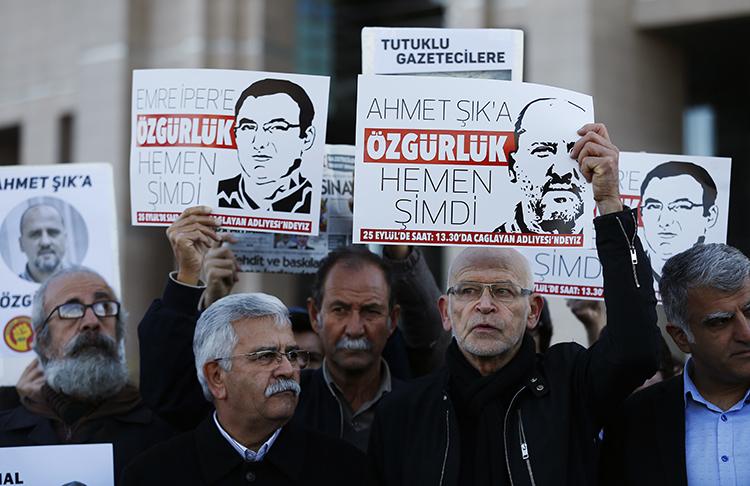Turkey Purges Continue as Nearly 19,000 Civil Servants Dismissed

Turkey witnessed yet another crackdown on government employees on July 8 as 18,632 civil servants were dismissed through a decree under the state of emergency. The list of those dismissed was published in the official gazette, which also stated that the passports of those dismissed would be cancelled.
The government has accused them of being members of terror organisations and other groups that pose a threat to the security of the state, including US-based cleric Fethullah Gulen and his banned Hizmet movement. The Turkish government blames Gulen and his followers of orchestrating the failed July 15, 2016 coup which resulted in the deaths of 265 people, including those who allegedly planned and carried out the coup. Gulen was once an ally of President Recep Tayyip Erdogan.
This decision by the government came just a day before Erdogan took charge as the executive president, and amid reports that the almost 2-year-long emergency would be lifted.
Two days earlier, on July 6, Turkish prosecutors had issued arrest warrants for 346 people, again citing alleged links to the Gulen movement. These include 271 military officers, including 122 on active duty.
Around 8,998 police officers, 3,077 soldiers, 1,949 air force personnel and 1,126 naval officers have been dismissed from service by this decree. Another 1,052 justice ministry officials, as well as 649 officials from the gendarmerie and 192 coast guard personnel, have also been dismissed. Additionally, the decree also sacked 199 academics even while reinstating 148 state employees from the military and various ministries who were fired under earlier emergency decrees.
Also Read: After Re-election, Erdogan Likely to Tighten Grip on Turkey
The decree also annulled the ranks of 1,500 retired military officials, cancelling their passports and pensions, besides closing down three newspapers, a television channel and 12 non-governmental organizations.
Turkey has been under a state of emergency since the failed coup attempt of July 2016. The emergency is likely to expire on July 18 unless it is extended for another term. Since the failed coup, more than 160,000 people, including police officers, police chiefs, military personnel, prosecutors, judges, academics and other civil servants have been dismissed from their jobs and more than 50,000 have been arrested on coup-related or terrorism charges.
In the days after the failed coup, 2,839 military personnel were detained and 2,745 judges were dismissed by Turkey’s top judicial body, the HSYK(Supreme Board of Judges and Prosecutors). Two judges from Turkey’s constitutional court and 10 judges from the HSYK were also detained. 163 generals and admirals were also detained, representing around 45% of the Turkish military's total top officials. 257 members of the Prime Minister’s staff were also held.
The crackdown also saw 15,000 teachers across the country being suspended, and 1,577 university deans in the country were asked to resign. 492 members of the country’s top Islamic authority were also removed.
Every section of Turkish society has been affected by this purge, with the media suffering severe restrictions. For the second year running, Turkey was named the world’s worst offender in terms of the number of journalists jailed, according to an annual report on press freedom released by the Committee to Protect Journalists (CPJ) in December 2017.
A total of 3 news agencies, 16 TV stations, 23 radio stations, 45 newspapers, 15 magazines and 29 publishers have been shut down, with 319 journalists being arrested since July 15, 2016.
A week ago, on July 6, a Turkish court awarded heavy jail terms to six journalists from the now defunct Zaman newspaper for allegedly backing Gulen. 6 out of the 11 accused were convicted and the remaining five were acquitted of all charges by an Istanbul court in the final hearing. The six convicted were charged with membership of an armed terror group.
Also Read: Tens of Thousands of Public Servants Still Jailed as Turkey's Repressive Erdogan Meets Trump
Two of them, Mumtazer Turkone and Mustafa Unal, were sentenced to 10 years and six months in jail. Two others, Sahin Alpay and Ali Bulac, were sentenced to eight years and nine months in jail but were allowed conditional release.
The court awarded jail terms of eight years and nine months for Ahmet Turan Alkan and nine years for Ibrahim Karayegen, both of whom were also conditionally released.
In April, 14 journalists, staff and board members of the Turkish daily Cumhuriyet were also sentenced to jail terms on April 25. They were accused of aiding a terrorist organization on the basis of alleged links to the Gulen movement. Human Rights Watch, which went through the evidence presented against them in court, said the convictions were clearly politically motivated, without any credible evidence provided of any criminality or wrongdoing.
The sentences ranged from two to eight years for the journalists. Before the completion of the trial, many of the journalists had spent months, if not years in detention. “The deeply unjust jail sentences handed to Cumhuriyet’s journalists, board and staff members are fresh evidence that the Turkish judiciary is failing to protect rights and defend the rule of law,” Hugh Williamson, Europe and Central Asia director at Human Rights Watch, said in response to convictions.
“Instead, Turkish courts act as the willing handmaidens for state repression,” he added.
In February, six journalists were given life sentences in connection with the coup attempt. They were accused of “attempting to overthrow the constitutional order.” Yet again, the journalists were accused of having links to the Gulen movement. Those sentenced included former editor-in-chief of the Taraf Newspaper, Ahmet Altan, his brother, journalist and academic Mehmet Altan, and well known Turkish journalist Nazli Ilicak.
In the beginning of the year, two reporters from the Turkish branch of the German newspaper Tageszeitung were detained and their homes in Ankara were searched by the anti-terror police for taking positions against the Turkish government’s military operations in Syria. The government had made dozens of arrests over social media posts for criticising, and at times, even discussing Turkey’s operations in Syria. These arrests have been made citing the need to stop “terror propaganda.”
Many pro-Kurdish activists have also been detained on similar charges. The head of the pro-Kurdish People’s democracy party (HDP), Selahattin Demirtaş, was one of those detained, He was held on trumped up terror charges and kept in detention indefinitely, from where he also contested the recently held presidential elections, finishing third.
Erdogan used the coup attempt to significantly expand his power and crush all opposition and dissent. Last year, he held a referendum to amend the constitution which granted him sweeping executive powers as the president. Turkish voters voted in favour of granting him those powers, but by a slender margin with only 51.3% voters supporting the proposal.
In June 2018, Erdogan comfortably won the presidential elections, receiving almost 53% of the vote, with his AKP (Justice and Development) party also emerging as the single largest force in the parliamentary polls, which were held at the same time.
Critics said the new system bestows too much power to one person, and accused Erdogan of having authoritarian and dictatorial tendencies. In a controversial move, Erdogan appointed his son-in-law, Berat Albayrak, as finance minister. Albayrak has been accused of being involved in the sale of ISIS oil through Turkey in 2015. Bayrak was made energy minister in 2015, after which he met with his Israeli counterpart Yuval Steinitz to discuss the normalization of ties between the two countries. He had also held discussions on an undersea gas pipeline project that would supply Israeli natural gas to Turkey and later Europe.
Get the latest reports & analysis with people's perspective on Protests, movements & deep analytical videos, discussions of the current affairs in your Telegram app. Subscribe to NewsClick's Telegram channel & get Real-Time updates on stories, as they get published on our website.
























